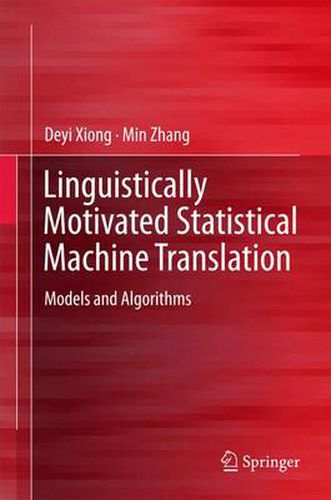Readings Newsletter
Become a Readings Member to make your shopping experience even easier.
Sign in or sign up for free!
You’re not far away from qualifying for FREE standard shipping within Australia
You’ve qualified for FREE standard shipping within Australia
The cart is loading…






This title is printed to order. This book may have been self-published. If so, we cannot guarantee the quality of the content. In the main most books will have gone through the editing process however some may not. We therefore suggest that you be aware of this before ordering this book. If in doubt check either the author or publisher’s details as we are unable to accept any returns unless they are faulty. Please contact us if you have any questions.
This book provides a wide variety of algorithms and models to integrate linguistic knowledge into Statistical Machine Translation (SMT). It helps advance conventional SMT to linguistically motivated SMT by enhancing the following three essential components: translation, reordering and bracketing models. It also serves the purpose of promoting the in-depth study of the impacts of linguistic knowledge on machine translation. Finally it provides a systematic introduction of Bracketing Transduction Grammar (BTG) based SMT, one of the state-of-the-art SMT formalisms, as well as a case study of linguistically motivated SMT on a BTG-based platform.
$9.00 standard shipping within Australia
FREE standard shipping within Australia for orders over $100.00
Express & International shipping calculated at checkout
This title is printed to order. This book may have been self-published. If so, we cannot guarantee the quality of the content. In the main most books will have gone through the editing process however some may not. We therefore suggest that you be aware of this before ordering this book. If in doubt check either the author or publisher’s details as we are unable to accept any returns unless they are faulty. Please contact us if you have any questions.
This book provides a wide variety of algorithms and models to integrate linguistic knowledge into Statistical Machine Translation (SMT). It helps advance conventional SMT to linguistically motivated SMT by enhancing the following three essential components: translation, reordering and bracketing models. It also serves the purpose of promoting the in-depth study of the impacts of linguistic knowledge on machine translation. Finally it provides a systematic introduction of Bracketing Transduction Grammar (BTG) based SMT, one of the state-of-the-art SMT formalisms, as well as a case study of linguistically motivated SMT on a BTG-based platform.